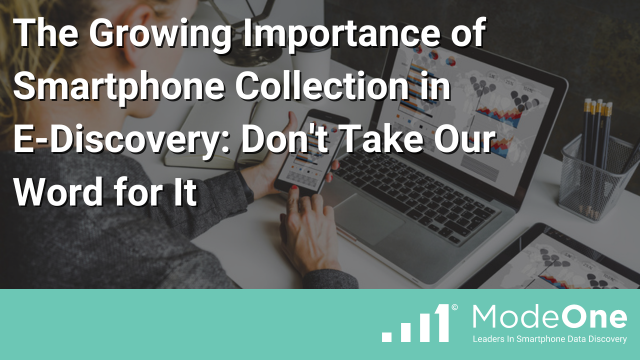Smartphone Device Data Collection and its Growing Importance in E-Discovery: Don’t Take Our Word for It
Whether employees bring their own devices (BYOD) or employers issue them, smartphones in the workplace enhance employee productivity and are integral to modern business operations. Smartphones facilitate collaboration, allowing employees to work together seamlessly. Smartphones let employees work remotely, increasing their flexibility to accomplish work outside the office. Mobile technology provides real-time access to critical data, and smartphone device data collection has become crucial.
According to the career and jobs website, Zippia, 97 percent of U.S. adults say they own a cell phone, and 85 percent of those say they own a smartphone. Ninety-three percent of U.S. employees who own a smartphone and spend at least a third of their time away from a desk use their cell phones for work every day.
Issuing smartphones to employees or allowing them to bring and use their device at work is a win-win for employers, until it’s not, as the United States Specialty Sports Association (USSSA) found out in Wegman v. The United States Specialty Sports Association, 2023 WL 8599972 (M.D. Fla. Dec. 12, 2023). Kelly Twigger, CEO of the eDiscovery Assistant, discussed Wegman in Episode 132 of the company’s Case of the Week series, focusing on the increasing role of employees’ mobile devices and smartphones in e-discovery and the importance of taking possession of smartphones or corporate data in exit interviews, especially if a duty to preserve exists in litigation or investigations.
In Wegman, the court compelled defendant Donald DeDonatis III to return three mobile devices to co-defendant USSSA and enjoined him not to make forensic images of the devices. USSSA and DeDonatis acknowledged their obligation to preserve evidence contained on the devices. Yet, at the outset, the court stated that DeDonatis “could bet dollars to donuts” and that he had to turn over the devices, denying DeDonatis’s motion seeking court authorization to create forensic copies before returning them to USSSA.
DeDonatis conceded that the devices were USSSA’s property. According to the company’s employee handbook, “all technology provided by USSSA, including computer systems, communication networks, Association related work records and other information stored electronically, is the property of USSSA and not the employee.” USSSA conceded it must preserve the evidence on the devices and make forensic copies once DeDonatis returns them so it can comply with its preservation obligations. Otherwise, DeDonatis’s retention of USSSA’s property prevents the company from fulfilling its duty to preserve evidence, prejudicing it—but in more ways than one.
The court acknowledged that organizations know what their employees know. During discovery, DeDonatis was on administrative leave after his relationship with USSSA “soured.” The devices may have contained evidence that the organization needs to determine what the former CEO knew, when he knew it, what he did about it, and who else was involved. But if DeDonatis kept relevant knowledge to himself, USSSA could not prepare a defense. DeDonatis’ failure to return USSSA’s devices prevented the organization’s collection efforts and frustrated its investigation.
Forensics expert Ryan Frye, Chief Innovation Officer at ModeOne, discussed his concerns with Twigger when a user’s device is not preserved immediately. Certainly, it can become lost or stolen. The user may also delete conversation threads that could become unrecoverable after a period, depending on the operating system recovery period for deleted files. A retention period may automatically delete messages after a set time rather than keeping them forever. The long story made short is that for every day the smartphone is outside of the employer’s custody and control, the probability that it will capture the data without heroic or costly efforts is reduced.
Why Smartphone Device Data Collection
With the prevalence of smartphones used in conducting business and their role as a prime source of evidence in litigation and investigations, employers must account for their use and return in employee handbooks and policies and put employees on notice that the company/employer can retain possession, custody, and control of issued smartphones and other mobile devices on demand as well as access, acquire, and preserve corporate data on personal smartphones used under a BYOD policy.
So, if your organization places an employee on administrative leave, be sure to develop and implement a device data collection policy to collect corporate smartphones and data (or business data from employee-owned devices), and enforce it. After all, investigations and litigation often follow administrative leaves, and your company will need access to employees’ smartphones to collect any relevant evidence to fulfill your discovery requirements. Otherwise, as in Wegman, you may have to invest time, effort, and expense to compel the employee to return corporate devices in a court proceeding.
